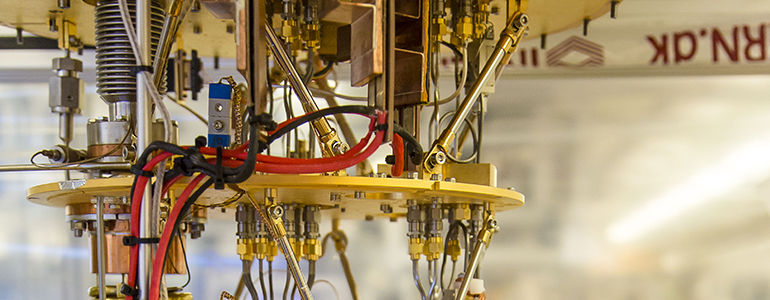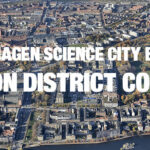Danish quantum technology development gets massive boost in Copenhagen Science City
Possibly the largest open quantum computer in Europe opens when Copenhagen Science City-partner University of Copenhagen, Niels Bohr Institute, establishes a new 25 quantum bits quantum computer where all components can be opened, examined and developed. It will be the largest of its kind on Danish soil and one of very few of the same size in Europe. The project, DanQ, is made possible thanks to a DKK 39.6 million investment from the Innovation Fund Denmark.
A technology suited to solving societal challenges
Danish quantum research is at the global forefront. With the new, large and open quantum computer, Innovation Fund Denmark hopes to translate this head start into a boost for industry. In the future, quantum computers can become a key tool for solving complex challenges in fields such as chemistry, material development and advanced medical models. This could make quantum computers ideal for solving societal challenges such as the green transition.
Copenhagen Science City is rapidly developing into a global hotspot for research and commercialising quantum research, and we see this latest investment from Innovation Fund Denmark as validation of our claim, that Copenhagen Science City is one of the best place in Europe to launch or scale an innovation based business”: Kristoffer Klebak, Head of Secretariat, Copenhagen Science City
Uniting basic and applied research with technology development
The new research project aims to unite basic research, applied research and technology development. The quantum computer will hold five times as many quantum bits as the second largest of its kind presently on Danish soil. Worldwide, research groups only have access to a handful of open quantum computers of a similar size.
This project testifies to our strong international position in the field. I am pleased to see how it sets the stage for close collaboration across companies, universities, and the healthcare system. This is completely in line with the government’s national strategy for quantum technology. Hopefully the project can bring quantum technology closer to contributing to solutions in areas such as health and climate”: Christina Egelund, Minister, Education and Research.
Unique tool to develop quantum technology
DanQ expects to have the quantum computer up and running by 2026. The project has a total budget of DKK 53.2 million.
Enormous sums are currently being invested internationally in quantum technology. If Denmark and Europe are to keep up, we need to understand now, what the technology can be used for in a number of years, when larger quantum computers have been developed . The project has the potential to provide both industry and research with a unique tool to develop quantum computer technology, which can both create jobs in Denmark and lead to solutions to major societal challenges”: Anders Eldrup, chairman, Innovation Fund Denmark.
Collaboration between academia and business
Over the next five years, the quantum computer will be tested by experts in quantum computer hardware at University of Copenhagens’ Niels Bohr Institute and experts in quantum computer software from the UCPH Center for Mathematics of Quantum Theory (QMATH). They will be joined by researchers from Aarhus University and from the two Danish startups Kvantify and QDevil/Quantum Machines who have both successfully commercialised quantum technology.
Investigating applications in climate and health
DanQ plans to examine concrete, future application possibilities that can accelerate the green transition and improve the way we work with health. This, they will do in close collaboration with Ørsted Wind Power and the Department of X-rays at Herlev/Gentofte Hospital and Steno Diabetes Center Copenhagen.
In order to uncover exactly where it makes sense, and perhaps more importantly where it does not make sense, to use future large quantum computers, investments like this one from the Innovation Fund are incredibly important.”: Morten Kjaergaard, Project manager, DanQ and Associate Professor, University of Copenhagen, Niels Bohr Institute.
Building a quantum workforce
Another aim with the investment is to start building a future workforce in quantum technology. When the computer is complete in 2026, it will be possible for other stakeholders to visit the lab and learn about quantum computer programming.
A thriving quantum community in Copenhagen Science City
University of Copenhagen has been a global centre for quantum research since 1922 when physicist Niels Bohr leveraged a Nobel Prize into funding for an institute bearing his name. More recently, several other initiatives have co-located in Copenhagen Science City in order to build on the innovation districts’ thriving quantum community.
- NATO DIANA Quantum Centre.
- University of Copenhagen’s Novo Nordisk Foundation Quantum Computing Programme.
- The Quantum Foundry.
- A.P. Møller Foundation “Center for Educational Quantum Advantage”.
- Deep Tech Lab Quantum.
- University of Copenhagen MSc programme in Quantum Science.
- Copenhagen Center for Biomedical Quantum Sensing
About Copenhagen Science City
Copenhagen Science City is one of Europe’s strongest innovation districts. It is located in the heart of Copenhagen. It has a unique concentration of some of the best and brightest minds, highly educated students from all continents and a cluster of innovative companies based in inspiring co-working spaces and innovation hubs. Access to state-of-the-art research and transport infrastructure is abundant. Some of Denmark’s most attractive residential areas and recreational activities are nearby.
The development of Copenhagen Science City is run by a high-level, strategic partnership of knowledge institutions, companies, innovation hubs and public authorities.




